
Coleophora lutipennella is a moth of the family Coleophoridae. It is found in most of Europe, except the Mediterranean islands.

Coleophora serratella is a moth of the family Coleophoridae. It is found in Europe, Japan (Hokkaido) and North America.
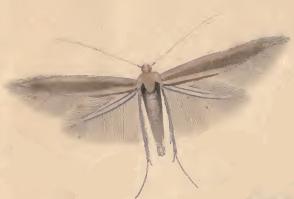
Coleophora lusciniaepennella is a moth of the family Coleophoridae. It is found in most of Europe, except the Iberian Peninsula, the Mediterranean islands and most of the Balkan Peninsula and Russia. It occurs in forest-steppe biotopes.
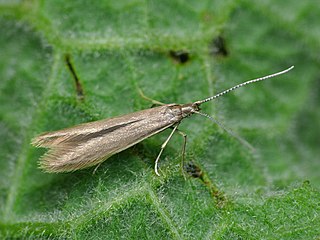
Coleophora caespititiella is a moth of the family Coleophoridae. This species is found throughout the United Kingdom and most of Europe. It is also known from North America. The Coleophoridae group are often collectively known as the case moths or case-bearers.

Parornix anglicella is a moth of the family Gracillariidae found in Asia and Europe. It was described in 1850, by the English entomologist Henry Tibbats Stainton, from a specimen from Lewisham, Kent.

Coleophora potentillae is a moth of the family Coleophoridae. It is found from Fennoscandia to the Pyrenees, and from Ireland to Poland.
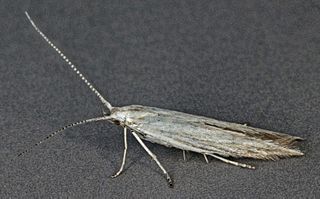
Coleophora striatipennella is a moth of the family Coleophoridae that is found in Europe and Near East. It has been introduced to New Zealand.

Coleophora ibipennella is a moth of the case-bearer family (Coleophoridae). It was first described by Philipp Christoph Zeller in 1849 and is found in Asia, Europe and North Africa. The larva feed within a pistol case on oak leaves and in the past was confused with Coleophora betulella, whose larva feed from a similar looking pistol case on birch leaves.

Coleophora albidella is a moth of the family Coleophoridae found in Europe. It was first described in 1775 by Michael Denis and Ignaz Schiffermüller,
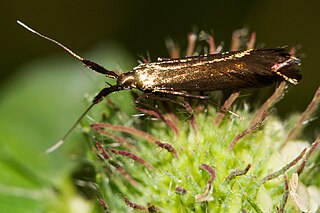
Coleophora deauratella is a moth of the family Coleophoridae. It is found in most of Europe, Asia Minor, Tasmania, North America and New Zealand.

The testaceous white-back is a moth of the family Coleophoridae. It is found in most of western Europe.

Parornix devoniella is a moth of the family Gracillariidae found in Europe. The larvae are leaf miners, feeding on the tissue inside the leaves of hazels Corylus species.
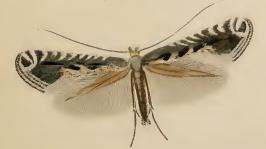
Parornix torquillella is a moth of the family Gracillariidae found in Europe. The larvae mine the leaves of Prunus species, such as blackthorn. It was described by the German entomologist Philipp Christoph Zeller in 1850, from specimens found in Florence, Leghorn and Pisa.

Coleophora siccifolia is a moth of the family Coleophoridae. It is found in most of Europe.
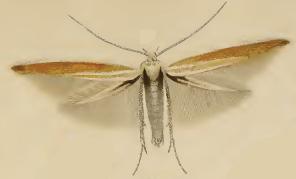
Coleophora discordella is a moth of the family Coleophoridae. It was first described by Philipp Christoph Zeller in 1849 and is found in Europe.
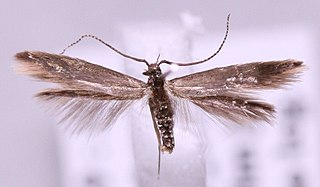
Coleophora fuscocuprella is a moth of the family Coleophoridae. It is found from Fennoscandia to the Pyrenees, Italy, Albania and Romania and from Ireland to Russia.
Coleophora lithargyrinella is a moth of the family Coleophoridae found in Europe.

Coleophora orbitella is a moth of the family Coleophoridae. It is found from Scandinavia and northern Russia to the Pyrenees and Italy and from Ireland to Poland and Hungary.
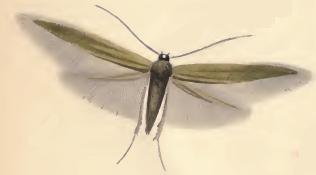
Coleophora paripennella is a moth of the family Coleophoridae. It is found in most of Europe, except the Iberian Peninsula and Balkan Peninsula.
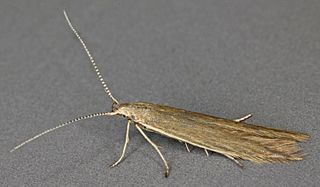
Coleophora alticolella is a moth of the family Coleophoridae, found in Europe and North America.













